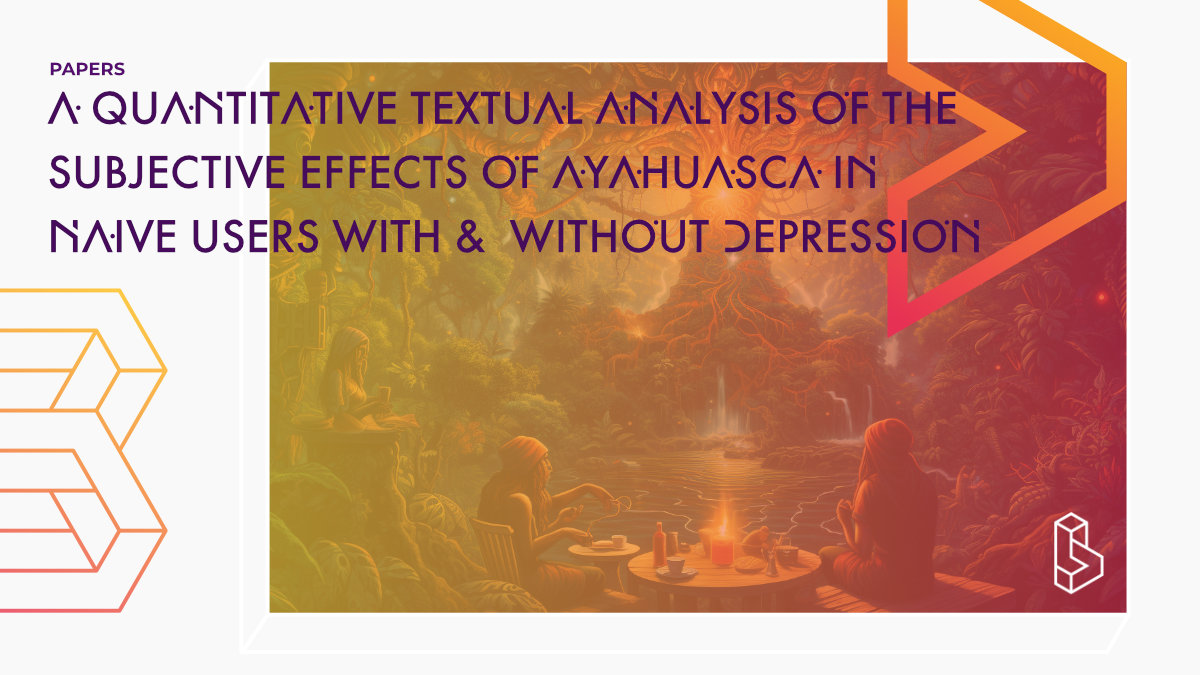This quantitative analysis (n=29) explores the self-reported experiences of first-time ayahuasca users, including nine individuals with treatment-resistant depression (TRD) and 20 healthy controls. Using quantitative textual analysis, five clusters were identified: alterations in consciousness, cognitive changes, somatic alterations, auditory experiences, and visual perceptual content. Individuals with depression displayed specific features, such as increased aversive bodily reactions.
Abstract of A quantitative textual analysis of the subjective effects of ayahuasca in naive users with and without depression
“Ayahuasca is a brew with psychoactive properties that has been used as an entheogen for centuries, with more recent studies suggesting it is a promising treatment for some clinical disorders. Although there is an emerging scientific literature on its effects, to the best of our knowledge no study has explored the self-reported experiences of first-time ayahuasca users with quantitative textual analysis tools. Accordingly, the current study aimed to analyze the subjective experience of naive individuals with depression and healthy controls after consuming ayahuasca. For this purpose, responses from a subsample of participants from a previous clinical trial to open-ended questions regarding their experience with ayahuasca underwent textual analysis. Data from nine patients with treatment-resistant depression and 20 healthy individuals were included, and quantitative textual analysis was performed using IRaMuTeQ 0.7 alpha 2 and R 3.1.2. The analysis identified five clusters: alterations in the state of consciousness, cognitive changes, somatic alterations, auditory experiences, and visual perceptual content. Additionally, findings suggest specific features of the experience of people with depression with ayahuasca, such as increased aversive bodily reactions. The results are consistent with previous findings indicating central axes of the psychedelic experience, and may inform therapeutic approaches using ayahuasca.”
Authors: Lucas Cruz, Bheatrix B. Favero, Fernanda Palhano-Fontes, Luís F. Tófoli, Dráulio B. Araújo & Daniel C. Mograbi
Summary of A quantitative textual analysis of the subjective effects of ayahuasca in naive users with and without depression
Ayahuasca is a brew with psychoactive properties made from the decoction of Jagube vine (Banisteriopsis caapi) and Chacrona leaf (Psychotria viridis). Indigenous groups have consumed it for centuries.
Ayahuasca has shown promise in the treatment of depression, which affects more than 300 million people worldwide.
Recent studies with ayahuasca in depressive patients have shown potential therapeutic effects. The study observed that depression severity was significantly reduced in participants who were dosed with ayahuasca when compared to placebo.
Find this paper
https://doi.org/10.1038/s41598-023-44193-5
Open Access | Google Scholar | Backup | 🕊
Cite this paper (APA)
Cruz, L., Bienemann, B., Palhano-Fontes, F., Tófoli, L. F., Araújo, D. B., & Mograbi, D. C. (2023). A quantitative textual analysis of the subjective effects of ayahuasca in naïve users with and without depression. Scientific Reports, 13(1), 19635.
Study details
Compounds studied
Ayahuasca
Topics studied
Treatment-Resistant Depression
Study characteristics
Interviews
Participants
29
Humans

